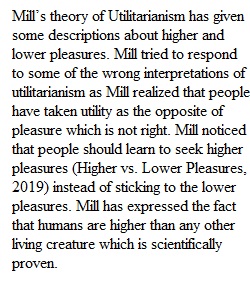


Q Discussion 2.1: Discuss Mill's Grand Claim 55 unread replies.55 replies. Why does Mill think that quality of pleasure, not just quantity, matters with respect to the evaluation of happiness in the principle of utility (greatest happiness principle)? What particular concern was he addressing? How do the pleasures of the higher kinds differ from those of the lower kinds? Who is in a position to decide which pleasures are of the higher kind and which are of the lower kinds? Mill then makes this grand claim: “It is better to be a human being dissatisfied than a pig satisfied; better to be Socrates dissatisfied than a fool satisfied. And if the fool, or the pig, are of a different opinion, it is because they only know their own side of the question. The other party to the comparison knows both sides.” Do you think Mill is right? Is it really better to be Socrates dissatisfied than a fool satisfied? Is it really better to have higher kinds of pleasure unsatisfied (unfulfilled) than have lower kinds of pleasure satisfied? Mill further writes: “A being of higher faculties requires more to make him happy, is capable probably of more acute suffering, and certainly accessible to it at more points, than one of an inferior type…” Besides Socrates, some individuals we know could fit the foregoing description, including Ernest Hemingway, Martin Luther King, Mother Teresa, Abraham Lincoln, and Rosa Parks, individuals who presumably cannot be satisfied with lower kinds of pursuits. But is it really better to have lofty goals or ideals that one can’t (easily) attain but keeps trying—and might remain unhappy trying—to attain than to have simple desires that can be easily satisfied? Discuss in light of the key ideas that Mill advances in his utilitarianism. (Again, do not do this off the top of your head. You have to show your understanding of the key ideas and arguments advanced by Mill such as his distinction between higher and lower kinds of pleasures and relate them to your discussion.)
View Related Questions